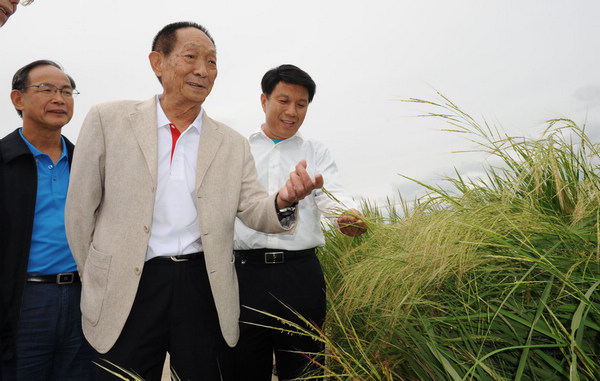Paddy papa going strong
Updated: 2011-12-04 08:31
By Feng Zhiwei, Li Yao and Jin Zhu (China Daily)
|
|||||||||
|
 |
|
Rain or shine, rice scientist Yuan Longping checks the crop at the experimental bases of the Academy of Agricultural Sciences in Guangxi. His tireless research has increased rice yields which help feed China. Yu Xiangquan / for China Daily |
You'll find him out in the fields more often than behind a lectern, and China's most famous rice scientist is still chafing at the bit. He wants to set new records for paddy yield when he is 90, reports Feng Zhiwei, Li Yao and Jin Zhu.
CHANGSHA - Yuan Longping's dream is to have a new hybrid rice that will yield at least 15 tons of grain per hectare, and he is already halfway there.
When he turned 80 last year, Yuan, known as "The Father of Hybrid Rice", made a birthday wish for a rice that will yield 13.5 tons a hectare by 2012, and up the production to 15 tons a hectare by 2020.
This September, his super rice brought in yields of 13.9 tons per hectare, setting a new world record, and accelerating his ambitions by a year.
Yuan started experimenting with rice varieties in the 1970s, and in 1974, he created the first Chinese rice hybrid. Close to 40 years later, he's still working at improving yields.
"I am a post-80er, but still with great ambitions," the scientist chuckled, punning on a term used to describe youngsters born after the 1980s. And, he says he has challenged himself to realize all his dreams before he turns 90.
Years out in the field in sun and rain has darkened his skin to a deep bronze, but he is still in excellent health, unlike most ordinary octogenarians.
He is widely known in China and internationally, and his work has contributed to the self-sufficiency in food for the world's most populous country.
Part of the reason that motivated his tireless research into improving rice yields was the hunger he suffered in the 1960s.
"At that time, grain was even more previous than gold. I never had a full stomach during that period, and that bitter memory is unforgettable. I even once dreamt that I had a bowl of fatty meat to eat, which I normally never had any appetite for," he says.
Although starvation is no longer an issue in China, Yuan still treasures every grain. He still spends all his time out in the experimental fields at the China National Hybrid Rice Research and Development Center based in Changsha, Hunan province. He is there every day.
"Even in the heat of summer, he stays several hours in the field. It is not easy, especially for someone over 80," Yuan's assistant Xin Yeyun says.
"Many people cannot understand why he works so hard, but I believe that in his eye, every grain is to be cherished and taken care of. Like a baby."
Yuan's research team achieved the target yields of 10.5 tons a hectare in 2000 and 12 tons a hectare in 2004, setting world records both times. Worldwide, the average yield on a plot of land of the same size is only 3.9 tons.
But Yuan knows that the breakthroughs in the field can only take place at the trial level, under controlled conditions.
"The actual rice output, both in China and other countries where the super hybrid rice is widely planted, is always about 80 percent of the expected yield, mainly because of local conditions and a shortage of agricultural professionals on the field," he says.
In 1999, under the support of the Hunan Provincial Academy of Agriculture and the Hunan Hybrid Rice Research Center, Yuan established a company.
Longping High-Tech helps encourage the use of hybrid rice in China and abroad.
The Shanghai-listed company exports 2,000 tons of hybrid rice annually, company statistics shows.
In 2010, China planted 6.7 million hectares of super hybrid rice, accounting for nearly 25 percent of the total acreage of rice, numbers from the Ministry of Agriculture showed. The increased output helps China feed 70 million people, Yuan says.
Meanwhile, another 3.4 million hectares of the super grain are now planted in seven other countries, including India, Vietnam and the United States.
"I have nearly 20 postgraduate students now and all of them are my successors," he says.
"I wish half the world's arable land can be planted with hybrid rice one day. By then, the super grain would be able to produce an extra 150 million tons of rice to feed an additional 400 to 500 million people."
For Yuan Longping, eternity can indeed be seen in a grain of rice.











